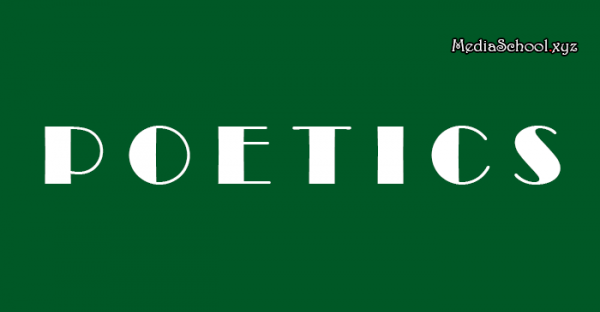By Sajeeb Sarker
Poetics
Media School August 10, 2020

Poetics is the theory of literary forms and it also includes literary discourses. English word 'poetics' has been derived from the Greek 'poietikos' that means 'pertaining to poetry'. It also translates literally into 'creative' or 'productive'.
Aristotle (384–322 BC), a highly celebrated Greek philosopher and polymath, is credited to be the earliest theorist in this regard for his classic book 'Poetics' ('De Poetica' in Latin). His 'Poetics' is acknowledged as the earliest surviving work of dramatic theory, and it is also considered to be the first extant philosophical exposition to focus on literary theory.
Author and scholar Terry V. F. Brogan identified 3 foremost movements in Western poetics over the past 3,000 years that essentially begins with the formalist, objectivist Aristotelian tradition. According to Brogan, poetics tended toward expressionism and emphasized the perceiving subject during the Romantic era (that originated in Europe towards the end of the 18th century, and in most areas was at its peak in the approximate period from 1800 to 1890). In the 20th century, it a returned to the Aristotelian paradigm, followed by trends toward metacriticality, or the establishment of a theory of poetics.
Poetics is often perceived as more significant than other methodologies of interpretation (e.g. hermeneutics) because of its focus on the meaning of a text as well as on the understanding of how a text's different elements come together and produce certain effects on the reader.
As of current practices, most literary criticism usually combines poetics and hermeneutics in a single analysis acknowledging distinguishable significance of the both.
Resources and useful readings
Annas, Julia (2001). Classical Greek Philosophy. Oxford University Press. ISBN 978-0-19-285357-8.
Belfiore, Elizabeth, S. (1992). Tragic Pleasures: Aristotle on Plot and Emotion. Princeton, N.J.: Princeton UP. ISBN 0-691-06899-2.
Bremer, J.M., Hamartia (1969). Tragic Error in the Poetics of Aristotle and the Greek Tragedy. Amsterdam.
Brogan, T. (1994). The New Princeton Handbook of Poetic Terms. Princeton: Princeton University Press. ISBN 978-0-691-03672-4.
Cave, Terence (1988). Recognitions: A Study in Poetics. Oxford.
Ciardi, John (1959). How Does a Poem Mean?. Cambridge, MA: The Riverside Press.
Culler, Jonathan (1997). Literary Theory: A Very Short Introduction.
Drew, Elizabeth (1933). Discovering Poetry. New York: W.W. Norton & Company.
Else, Gerald F. (1986). Plato and Aristotle on Poetry. Chapel Hill/London.
Gérard Genette (2005). Essays In Aesthetics. Volume 4.
Halliwell, Stephen (1986). Aristotle's Poetics. Chapel Hill. ISBN 0226313948.
Harmon, William (2003). Classic Writings on Poetry. New York: Columbia University Press.
Hashmi, Alamgir (2011). "Eponymous Écriture and the Poetics of Reading a Transnational Epic". Dublin Quarterly, vol 15.
Irwin, Terence; Fine, Gail, eds. (1996). Aristotle: Introductory Readings. Hackett Pub. ISBN 978-0-87220-339-6.
Jones, John (1971). On Aristotle and Greek Tragedy. London.
Kennedy, George Alexander; Norton, Glyn P. (1999). The Cambridge History of Literary Criticism: Volume 3. ISBN 0521300088.
Kinzie, Mary (1999). A Poet's Guide to Poetry. Chicago: University of Chicago Press. ISBN 0-226-43739-6.
Knight, Kelvin (2007). Aristotelian Philosophy: Ethics & Politics from Aristotle to MacIntyre. Polity Press. ISBN 978-0-7456-1977-4.
Olson, Charles (1950). Projective Verse. New York, NY: Poetry New York.
Preminger, Alex (2016). Princeton Encyclopaedia of Poetry and Poetics. Macmillan International Higher Education. ISBN 978-1-349-15617-7.
Quinn, Arthur (1993). Figures of Speech. Hillsdale: Lawrence Erlbaum Associates. ISBN 1-880393-02-6.
Sifakis, Gr. M. (2001). Aristotle on the Function of Tragic Poetry. Heraklion. ISBN 960-524-132-3.


